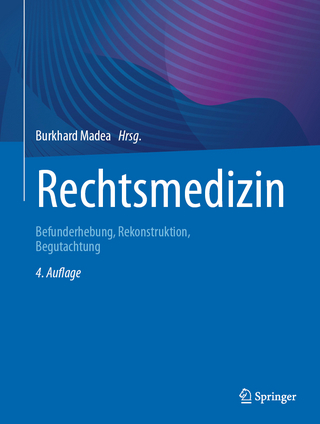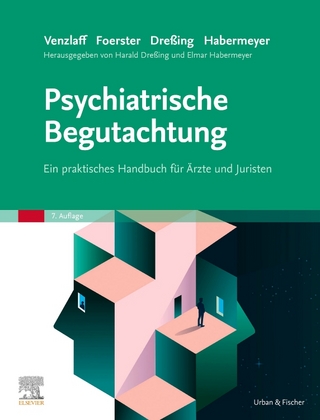
Forensic Odontology
Wiley-Blackwell (Verlag)
978-1-118-86444-9 (ISBN)
- Lieferbar (Termin unbekannt)
- Versandkostenfrei
- Auch auf Rechnung
- Artikel merken
Forensic Odontology: Principles and Practice pulls together the very latest research findings and advice on best practice and essential skills, including aspects of forensic science that provide a well-rounded educational experience for the reader. Chapters provide coverage of anatomy and morphology, mortuary techniques, physical anthropology, applied forensic sciences, child and elder abuse, and facial approximation. The text introduces the various topics and discusses underpinning philosophies without being an exhaustive historical treatise. Appropriate case studies are used to highlight issues, and references to current research are provided to stimulate further reading and research.
Written by experienced practitioners in the field, this informative introductory text is invaluable to graduate and undergraduate students, as well as experienced dentists, wishing to gain experience or pursue a career in forensic odontology. This text will be a welcome addition to the forensic odontological libraries of all practicing forensic odontologists.
Editors Jane A. Taylor Faculty of Health and Medicine, University of Newcastle, Australia Jules A. Kieser (Deceased) Faculty of Dentistry, University of Otago, New Zealand
Contributors xiv
Dedications xvi
Preface xviii
1 Foundation knowledge in forensic odontology 1
Jules A. Kieser, Jane A. Taylor, Zaf Khouri and Maurice Churton
Introduction 1
A short history of forensic odontology 2
Forensic odontology in Australia 5
Forensic odontology in New Zealand 10
Working as an odontologist 19
References 20
2 Jurisprudence and forensic practice 23
David L. Ranson
Legal systems and the healthcare community 23
Types of law 28
The coronial system 32
The investigators within the coroner’s jurisdiction 38
Court procedures and the expert medical witness 41
Report writing 57
Reference 63
Recommended reading 63
3 Anatomy and morphology 64
Mark Leedham and Erin F. Hutchinson
Dental anatomy and morphology 64
Osteology of the juvenile and adult craniofacial complex 77
References 130
4 Forensic pathology 134
David L. Ranson and Norman Firth
The role of the forensic pathologist 134
The medico‐legal autopsy 135
Radiological examination 140
External examination 141
Internal examination 144
Post‐autopsy procedures 154
Injuries 155
Injury and cause of death 165
References 166
Recommended reading 166
5 Human identification 167
Stephen Knott
Human identification 167
Methods of identification 168
Human dentition 169
Role of the primary identifiers 171
Ante‐mortem dental data 173
Radiographic images: facial sinuses and anatomical features within the bone 176
Superimposition 178
Facial reconstruction 179
References 183
6 Mortuary techniques 185
Alain G. Middleton
The dental post‐mortem 185
Components of a dental post‐mortem 186
Equipment – basic requirements 186
‘Tools of the trade’ 188
Radiographic equipment 192
CT scanning equipment 192
Teeth for DNA analysis 192
The ‘what and how’ 193
Recording of the findings 197
Procedure – putting it all together 203
Reporting recording of results 207
Reference 208
7 Age assessment 209
Richard Bassed, Jeremy Graham and Jane A. Taylor
Introduction 209
Some history of age assessment 211
A brief review of dental development 212
Developments in dental‐age assessment 214
Current age‐estimation methods 215
Australasian specific research in dental age estimation 217
Concluding remarks 221
References 224
8 Bite marks 228
Alex Forrest and Alistair Soon
Introduction 228
Describing bite marks 229
The process of biting and how it relates to bite marks 235
The individuality of the dentition and its transfer to the bite mark 236
Imaging in bite mark cases 238
Undertaking the case 249
Presenting bite mark evidence in court 273
Sources of potential distortion and error in bite mark cases 275
Limitations of bite mark analysis and reporting the outcomes of bite mark comparisons 277
Can we determine the age of the biter from the injury arch dimensions? 279
Can we visually age bite marks? 280
Swabbing for DNA 280
Conclusion 281
Future directions 282
References 283
9 Forensic odontology in disaster victim identification 286
Hugh G. Trengrove
Disasters and disaster planning 286
DVI phase 1: the Scene phase 298
DVI phase 2: the Post‐mortem phase 310
DVI phase 3: the Ante‐mortem phase 323
DVI phase 4: the Reconciliation phase 327
DVI phase 5: the Debrief 331
References 335
10 Forensic anthropology 336
Denise Donlon, Russell Lain and Jane A. Taylor
The scope of forensic anthropology 336
Assessment of ancestry 336
Assessment of sex 339
Sexual dimorphism in the dentition 342
Assessment of age 343
Comparative anatomy 344
Historical remains 347
Conclusion 351
References 351
11 Applied forensic sciences 355
David C. Kieser, Terry Lyn Eberhardt, Gemma Dickson and J. Neil Waddell
Introduction 355
Crime scene protocols 356
Forensic entomology 358
Forensic microbial aquatic taphonomy 363
The use of energy‐dispersive spectroscopy in forensic investigations 369
References 375
12 Odontology opinions 377
Denice Higgins and Helen James
Introduction 377
General principles 377
Types of opinions 379
Report writing 399
References 400
13 Forensic odontology management 402
Helen James and Denice Higgins
Introduction 402
Administration 402
Education 414
Research 415
Conclusion 416
References 417
14 Application of post‐mortem computed tomography to forensic odontology 419
Richard Bassed and Eleanor Bott
Introduction 419
Computed tomography and medico‐legal death investigation 421
Application of PMCT to odontology 423
Computed tomography and Disaster Victim Identification (DVI) 428
Conclusion 435
References 435
Index 438
| Erscheinungsdatum | 29.02.2016 |
|---|---|
| Verlagsort | Hoboken |
| Sprache | englisch |
| Maße | 175 x 252 mm |
| Gewicht | 966 g |
| Themenwelt | Studium ► 2. Studienabschnitt (Klinik) ► Rechtsmedizin |
| Medizin / Pharmazie ► Zahnmedizin | |
| Naturwissenschaften ► Biologie | |
| Naturwissenschaften ► Chemie ► Analytische Chemie | |
| ISBN-10 | 1-118-86444-1 / 1118864441 |
| ISBN-13 | 978-1-118-86444-9 / 9781118864449 |
| Zustand | Neuware |
| Haben Sie eine Frage zum Produkt? |
aus dem Bereich


